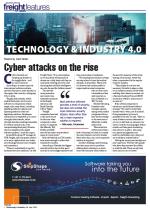The logistics sector needs to speed up technology implementation or risk being left behind.“Logistics by nature is process driven, it naturally lends itself to advancement through technological innovation,” says James Britz, Group IT Manager at CFR Freight.
“However, logistics companies have difficulty in getting out of the operationally driven mindset and they often do not have the technical skills to drive proactive, impactful technological and therefore business change. As a sector, logistics companies are far behind and that is why a company like Amazon, for example, which is technically strong, will start to dominate the supply chain going forward.”
According to Britz, logistics executives need a culture change to see technology as a game changer and not a reactive support role through the lens of a grudge purchase. He also says the industry needs to differentiate between staff and the systems. “The talent lies with the staff as they create and maintain the systems that drive the business. The emphasis should therefore be placed on the staff rather than the systems themselves.”Britz says CFR Freight is currently in the process of piloting an online portal that will allow its ocean freight customers to work with the company in a more streamlined fashion.
“Through this portal they will have the ability to quote, accept the quote, book and allocate to a sailing schedule, all from a central point and with full visibility during the process,” he explains.
“Cutting out emails and phone calls will allow our customers and ourselves to be more streamlined, structured and efficient. It will give us the ability to do more in less time, but with the same number of staff.”
The company is also investing in building a well-structured business intelligence (BI) and analytics arm to complement its existing technology offering.
BI leverages software and services to transform data into actionable insights to guide and inform business decisions in an organisation.“The world is f looded with data; we have more data than we know what to do with,” says Britz.
“Having real-time or near real-time data is, however, only the beginning. It is about having the ability to shift out the noise, isolate the correct data, and turn this into intelligence and then knowledge – that is key. No business should be making decisions on experience and client relationship alone anymore; in modern business you need the third element, you need the data science.

